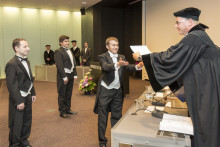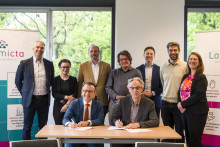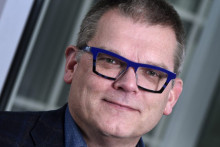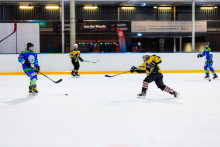Veldhuis's research project is titled, Leonardo's Paradox: `The spiraling bubble' in honor of Leonardo da Vinci who first noticed that single rising bubbles in water do not always go straight up. Veldhuis elaborates, `Look in your glass of beer or Coke and you might see the same phenomenon. Besides bubbles, we also investigate spherical particles. Depending on their density they also behave differently and might go in straight, zigzag or spiral paths. We are investigating the causes of these deviations from the straight path. At Johns Hopkins I had the opportunity to work with an existing numerical program, which simulates my experiments exactly. In the Netherlands we do not have such a program. Professor Andrea Prosperetti, the project supervisor and an internationally respected expert on the physics of bubbles, invited me to work in his group at the Johns Hopkins University.'
Veldhuis took two courses in the US and was taken aback by the number of courses American PhD students take. `In the USA, students take far more courses than we do here. The first year - in some cases the first two years - is spent full-time only on extremely rigorous courses, and research begins only in the third year. A lot more is expected of the students; I would call it a very demanding system. I think in the Netherlands we work for about forty-five hours a week; in the USA, students slog it out for sixty hours! Small wonder that they are extremely busy all the time. I asked one of my friends there to accompany me for a beer on a Saturday. He declined because he had an appointment with his professor the following Sunday! How bizarre!' he exclaims rolling his eyes. As to the reasoning behind the course-oriented approach, he surmises, `Maybe it is to establish a certain level for everyone. After the first year, every student must take a qualifying exam to continue.'
This was Veldhuis's first visit to the USA. He gives his general impression of the Americans: `They are extremely polite but they seem to be quite distant. I had friends there from Brazil, Italy, Pakistan, and they used to joke that Americans have amazingly short memories - one should not be very surprised if they did not remember what they themselves told you only yesterday. I suppose that is true if one is working for 60 hours.'
Veldhuis was enchanted with the university campus with its neoclassical architecture. `When I entered the university for the first time, I was quite impressed with the campus. What impressed me more was that as I walked along the corridor reading office-door nameplates, I could recognize quite a few names from various publications I had read.'
Another thing that struck Veldhuis at Johns Hopkins was the infrastructure available to students. He says, `The library was perfect. It had everything one could ask for and it was wonderful to sit there and work. But I was quite shocked by their computers. Here we have a computer for every student, it was not so there. Also, some of the computers were quite archaic. I was told that some students even bought their own printers. I would not have expected this to happen in a country like the USA. In the Netherlands, a PhD student almost demands a good machine with the latest developments. I cannot say that what I saw at Johns Hopkins is the norm in the USA, maybe it depends on the group in which one is working.'
By the way, if you have (had) the opportunity to study in another country and would like to share your experience, please contact us at [email protected]







